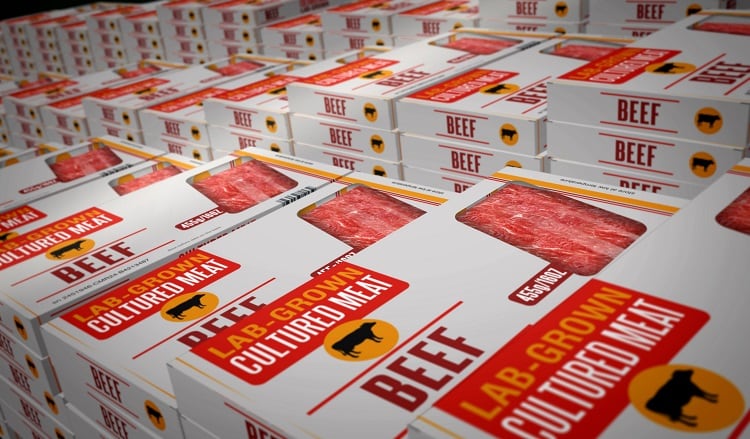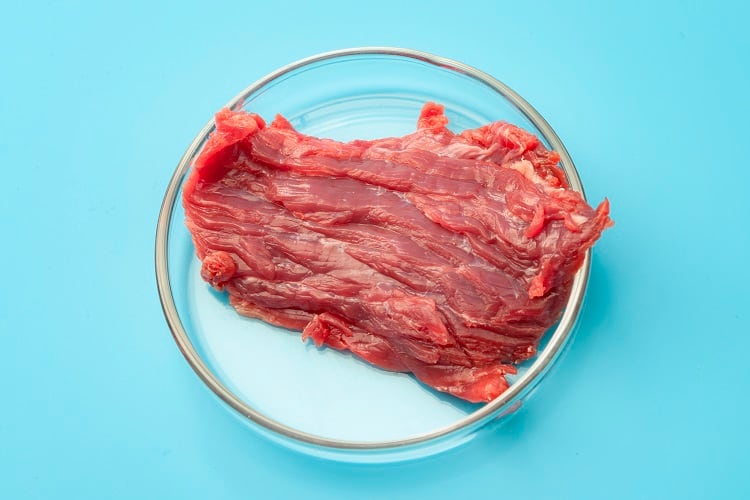Cultivated meat – otherwise known as cultured, lab-grown, or cell-based meat – is produced from real animal cells that are grown and arranged in a similar structure to animal tissues. Cultivated meat products are designed to mimic the sensory and nutritional profiles of their conventional counterparts, slaughter-free.
The first cultivated meat burger was produced in 2013, but it wasn’t until late 2020 that a cell-based meat product officially entered the market in Singapore. Since that time, another cultivated chicken product has successfully completed a pre-market safety review in the US, but more regulatory checks are required ahead of commercialisation.
Two other regions are well-known for their thriving cultivated meat ecosystems – the European Union and Israel – but neither has put products on the market. How do these systems work? And what needs to change to get cultivated meat on their consumers’ plates?
Israeli process like Singapore’s, but with less progress
Israel is a hotbed of cultivated meat activity, with three of the first eight cultivated meat companies in the world hailing from the Middle Eastern country: Aleph Farms, SuperMeat, and Believer Meat (formerly Future Meat Technologies).
According to Ambika Hiranandani, a legal, policy and partnerships advisor to alternative protein companies and Good Food Institute (GFI) alumni, several companies have already submitted dossiers for regulatory approval, but none have been granted so far.
This is not a sign that Israel’s regulatory process is flagging, in fact Hiranandani praised Israel’s regulatory structure for naming one person within the government responsible for handling dossier submissions. A similar structure was implemented in Singapore.
“There are similarities between Singapore and Israel’s models. Even though Israel hasn’t given regulatory approval to anyone as yet, [we know cultivated meat] fits within their novel foods framework [and will require pre-market authorisation]. They have a single point of contact who works on it but haven’t proceeded quite as far as Singapore.”
From Madeline Cohen’s perspective, a senior regulatory attorney at GFI, the Israeli Government is still in the process of determining exactly what the safety assessments for cultivated meat will look like. But the willingness is there.
In September last year, for example, the Israeli Ministry of Health worked with the UN Food and Agriculture Organization (FAO) to convene researchers and develop ‘various aspects’ of cultivated meat and dairy, including food safety and regulation, we were told. “In past years, they’ve convened similar roundtables to bring experts together and think through what should be included in [cultivated meat] safety assessments.”
Where exactly the Government is in this process is uncertain since it has yet to publish guidance on regulation specific to cultivated meat. It’s possible such documentation is on the way, however, which would help companies know exactly what should be submitted, and what the National Food Control Service will look at when making pre-market authorisation decisions.

What is certain, is that Israel has been amongst the leading countries in terms of cultivated meat funding. Just last year, the Israel Innovation Authority granted $18m (€16.7m) to a new Israeli consortium for cultivated meat development. “The country is definitely very interested in being a leader in this space.”
EU a ‘slower process’ with limited pre-market consultation
The EU, on the other hand, is renowned for its stringent and time-intensive Novel Foods regulatory process, which some estimate could easily take a minimum of nine months, and even up to 18 months or longer. This has yet to be seen in cultivated meat, however, as FoodNavigator is not aware of a company having submitted a novel food dossier on cell-based meat to the European Food Safety Authority (EFSA).
This is no reflection of the size of Europe’s cultivated meat ecosystem, which is thriving. Europe is home to a host of cultivated meat majors, including Mosa Meat and Meatable in the Netherlands, JBS-owned Biotech Foods in Spain, and Gourmey in France, amongst others.
An obvious positive about the EU’s regulatory process for cultivated meat products is that it’s crystal-clear which regulations apply: Novel Foods law is well established, having been around since 1997. EFSA has been working through novel food authorisations since that time for other types of products, but GFI’s Cohen is concerned that ‘limited consultation’ occurs between EFSA and companies prior to dossier authorisation.
This could be why a cultivated meat company has yet to submit a dossier, she suggested. “That can leave things a bit more ambiguous perhaps, compared to places like Singapore or the US, where there are more opportunities for consultation [with regulators] early on in the process.”
Another complication for companies wanting to market cell-based meat products in Europe lies in an extra step set out by the Commission. Within seven months from the date of the publication of EFSA’s opinion, the Standing Committee on Plants, Animals, Food and Feed must vote on its implementation into the Novel Foods dossier. If the vote is favourable, the product can be lawfully placed on the EU market.
This is a ‘complicated step’, explained Cohen. “You go through EFSA first, then the vote. So the process is estimated to take closer to 18 months and even up to three years for some products.
“EFSA has taken a long time with some other novel food products in the past, so it’s not clear how long it would take from the time a company submits a cultivated meat dossier to the time EFSA makes a final decision, and then the Commission votes on that decision.
“It certainly seems like a slower process and there’s not quite as much clarity for companies on what exactly they need to provide, given the limited pre-market consultation process.”
Can Europe take any learnings from Israel?
Cohen’s primary recommendation for EU policymakers is to emphasise the need for transparency in the approval process and to ensure pre-market consultation is readily available.
“There is limited availability to do that, but making it clear to companies what they need to submit ahead of time [is important],” she told FoodNavigator. Providing companies with a ‘general idea’ of timelines could also be helpful.
Cohen believes this could encourage greater focus on the EU market for cultivated meat companies. “Understandably, companies may want to seek approval first in places where they’re surer of exactly how long it will take to enter the market. It might be a little riskier [for the company] if that process drags on…”

For Hiranandani, the EU can learn much from other geographies – notably Israel, Singapore and the UK – where governments have implemented a ‘single point of contact’ to receive novel food submissions.
“That’s one thing that lacks in the European Union.”
In ‘Dissecting cultivated meat regulation part 2’, we’ll look at the challenges and opportunities that exist in the US and Singapore's regulatory frameworks for cultivated meat.



